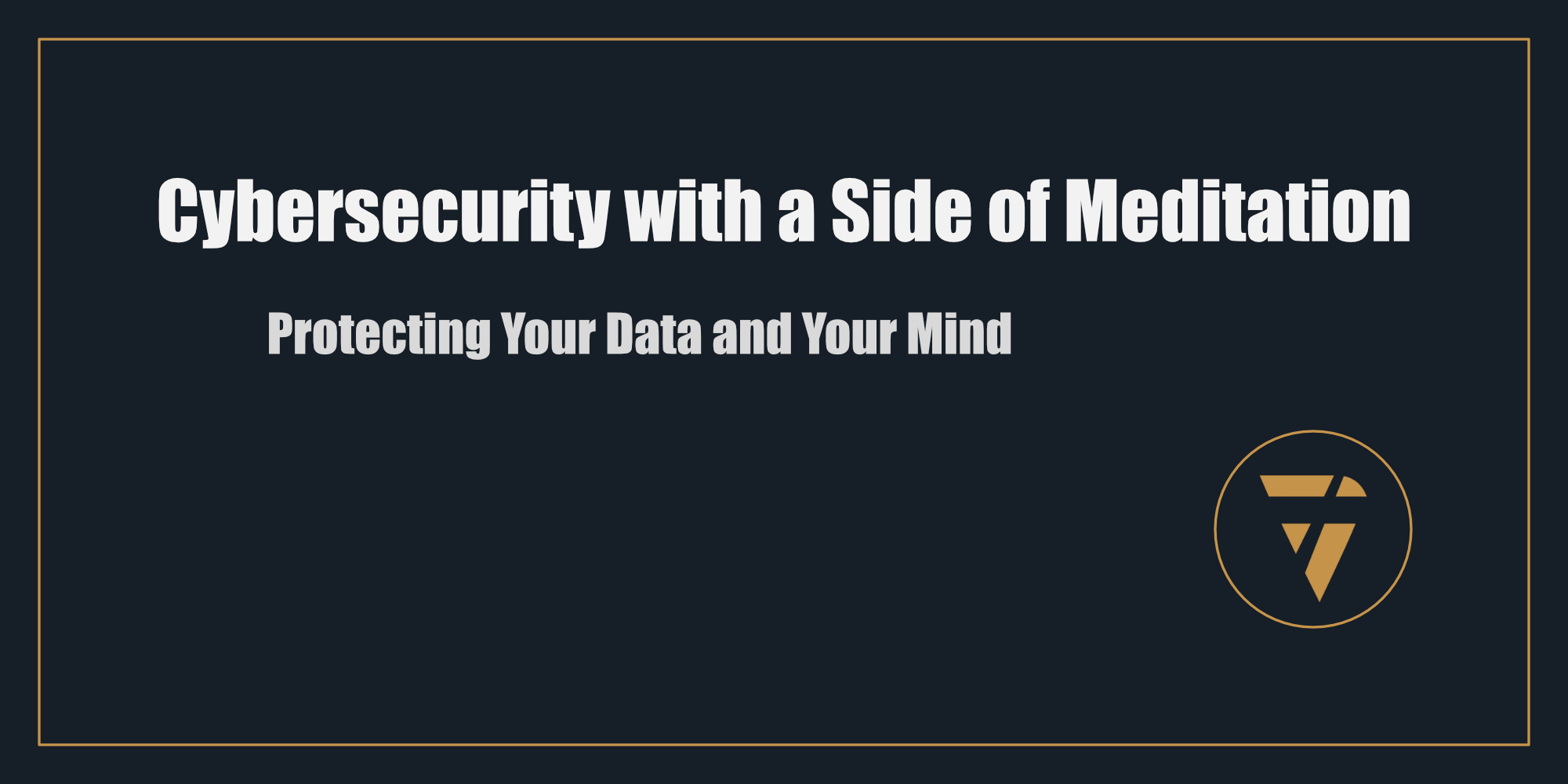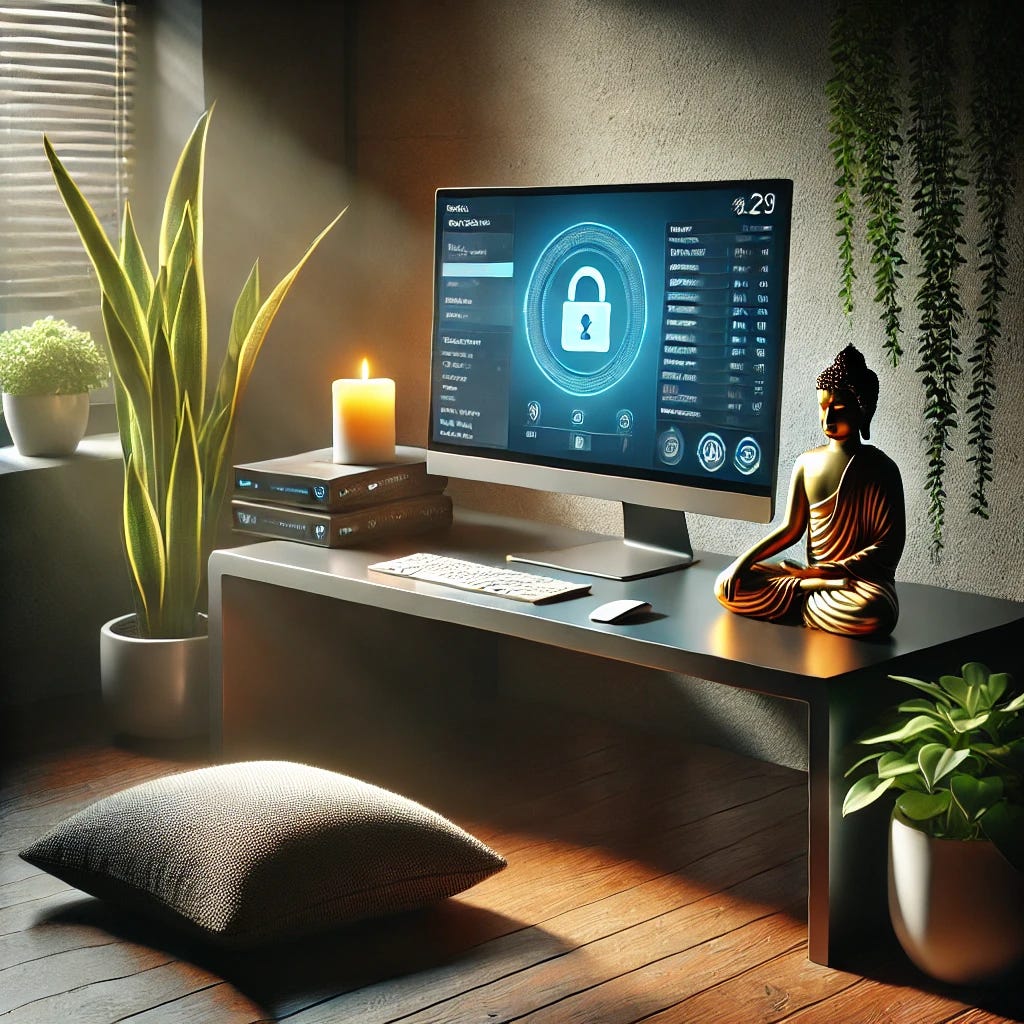Cybersecurity with a Side of Meditation
Protecting Your Data and Your Mind

What if firewalls and mindfulness were both essential to survival in the digital age?
In an era where data breaches are as common as notifications on your phone, the boundary between our digital and mental lives has all but disappeared. The more we invest in digital defences—VPNs, firewalls, multi-factor authentication—the more our mental defences often lag behind, leaving us vulnerable not just to hackers but to the relentless barrage of stress, overwhelm, influence, and burnout.
What if the secret to thriving in this hyperconnected world wasn’t just stronger passwords, but a stronger, more resilient mind?
This isn’t a call to trade your two-factor authentication app for a yoga mat. It’s an invitation to rethink how we approach security—of both our data and our inner selves. Welcome to the concept of Zen-Security, where mindfulness and cybersecurity converge to protect the two most valuable assets you own: your information, and your peace of mind.
The Parallels Between Firewalls and Focus
Let’s start with firewalls. These digital guardians monitor and control incoming and outgoing network traffic, blocking malicious attempts to infiltrate your system. Sounds a lot like what mindfulness does for your brain, doesn’t it?
Mindfulness acts as a mental firewall, helping you observe the constant flow of thoughts, emotions, and distractions without letting the destructive ones infiltrate your peace. Just as an unprotected network is a hacker’s playground, an unguarded mind is fertile ground for stress and anxiety to take root.
The good news? The same principles that underpin effective cybersecurity can be applied to your mental well-being:
- Awareness of Threats: In cybersecurity, this means understanding risks like phishing emails or weak passwords. In mindfulness, it’s recognizing intrusive thoughts or emotional triggers before they take over.
- Layered Defences: A strong cybersecurity strategy uses multiple tools—antivirus software, encryption, etc. Similarly, a resilient mind relies on a mix of practices: meditation, journaling, and intentional breaks.
- Regular Updates: Just as software needs frequent updates to counter new threats, your mindfulness practice needs regular refreshes to stay effective.
The Anatomy of Zen-Security
So how do we marry these concepts into a cohesive lifestyle? By building habits that protect both your data and your mind simultaneously. Here’s a roadmap:
1. Start with an Audit: Assess Your Vulnerabilities
Before securing anything, you need to understand your weak points.
- Digital Audit: When was the last time you updated your passwords? Are you using public Wi-Fi without a VPN?
- Mental Audit: How often do you find yourself stressed or distracted? Are there specific triggers—emails, deadlines, social media—that hijack your focus?
The key to improvement is clarity. Knowing your vulnerabilities is the first step in addressing them.
2. Set Up Two-Factor Authentication—for Your Thoughts
Two-factor authentication (2FA) is one of the simplest ways to bolster your online security. Why not apply the same principle to your thoughts?
The next time a stressful idea pops into your head, pause and ask:
- Is this thought useful or just noise?
- How does it align with what I’m doing right now?
This simple mental checkpoint slows the flood of intrusive thoughts, much like 2FA blocks unauthorized access.
3. Schedule Downtime Like a System Maintenance Window
No network operates at peak performance 24/7. IT teams schedule regular maintenance windows to optimize performance and security. Your brain deserves the same.
Set aside intentional “downtime” each day:
- Morning meditation to set your mental firewall.
- Afternoon walks to clear cache memory.
- Evening journaling to close unresolved tabs in your mind.

The Zen Hacker’s Toolkit
Just as cybersecurity professionals rely on specific tools, so too can you equip yourself with mindfulness practices tailored to our digital world:
- Digital Detox Meditation: Spend 10 minutes each day in a quiet space, visualizing your mind as a secure server. Imagine threats bouncing off your defences, leaving you calm and unshaken.
- The Breathing CAPTCHA: Practice deep breathing whenever you feel overwhelmed. Think of it as a CAPTCHA test for your stress—proving you’re human before letting the pressure through.
- Password-Protected Intentions: Before diving into your inbox or starting a project, set a clear intention. This is your mental “password,” ensuring only authorized thoughts gain access.
Why It Matters
The cost of neglecting cybersecurity is obvious: stolen identities, lost money, and compromised trust. But the cost of neglecting mindfulness is just as steep: chronic stress, reduced productivity, and a deteriorating sense of self.
In truth, both forms of protection are intertwined. A calm, focused mind is less likely to click on a phishing link or make impulsive online purchases. Similarly, a secure digital environment reduces the mental toll of constant vigilance.
By adopting Zen-Security, you’re not just safeguarding your digital life. You’re creating a foundation for mental clarity, resilience, and peace—a state of being that no hacker can breach.
Your Zen-Secure Challenge
Over the next week, try integrating one mindfulness practice and one cybersecurity habit into your daily routine. For instance:
- Enable two-factor authentication on all your accounts while practicing two breaths of intentional pause before reacting to stressful events.
- Use a password manager to generate strong, unique passwords while using gratitude journaling to generate a strong, grounded mindset.
The result? You’ll feel safer, sharper, and calmer in ways you never thought possible.
The world may be chaotic, but your mind and your data don’t have to be. Build your defences, find your calm, and embrace the Zen-Secure lifestyle.
What Do You Think?
What’s your biggest digital or mental security challenge? Share your thoughts, or connect with me for a deeper conversation. Let’s protect what matters most—together.
This Substack is reader-supported. To receive new posts and support my work, consider becoming a free or paid subscriber.
This is what I’m working on. Tell me what you think, I enjoy the conversation! Subscribe and follow the work in real time.
Thanks!
B
Firewalls protect your data. Mindfulness protects your mind. Ignore either, and you’re leaving yourself open to hackers—or burnout. Build both defences. Stay Zen-Secure.
PS -





